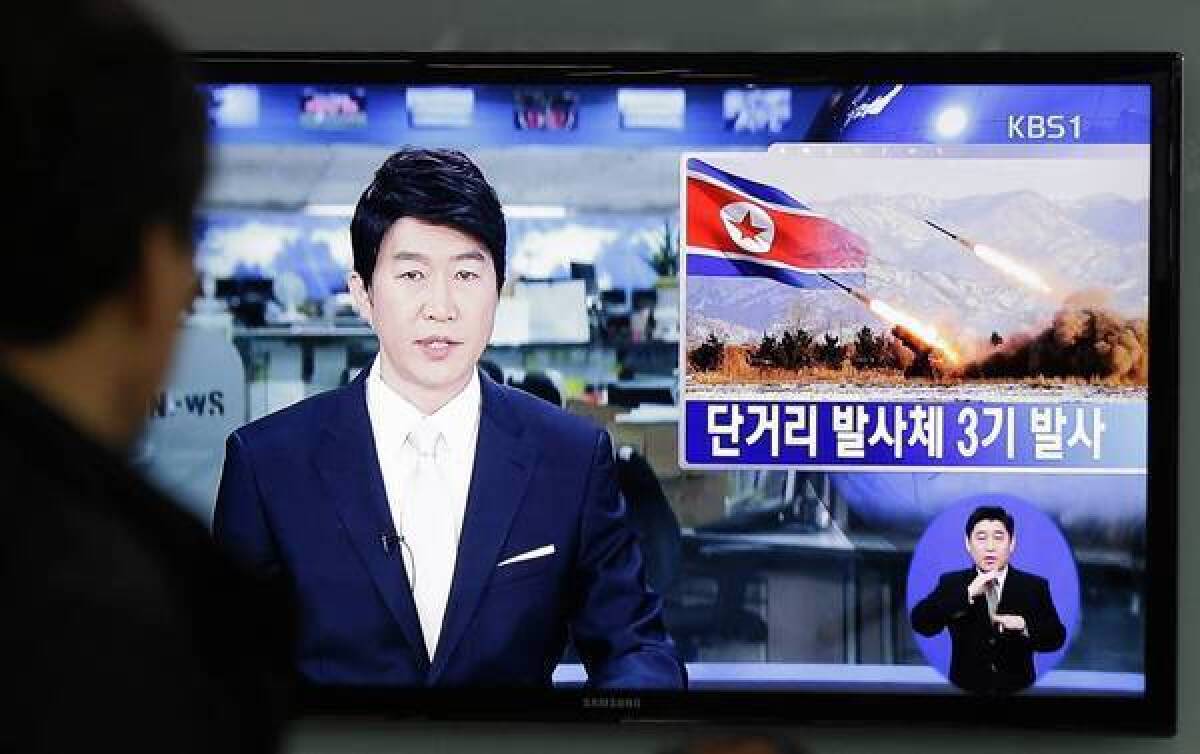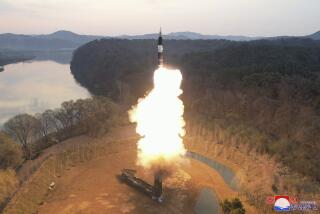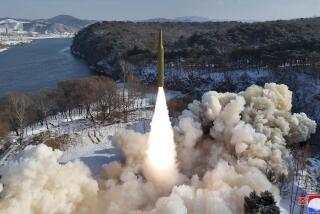North Korea fires short-range missiles off east coast

BEIJING — North Korea fired three short-range missiles off its east coast Saturday, following through on months of threats to conduct a missile launch.
The South Korean Defense Ministry reported that it detected two launches in the morning and another in the afternoon. Its initial assessment was that the missiles were short-range surface-to-ship or surface-to-surface missiles capable of traveling up to 72 miles, rather than the new medium-range Musudan missile that analysts fear could threaten U.S. troops in Guam or Okinawa, Japan.
“All missiles launched fell into the sea,” a South Korean Defense Ministry official was quoted as telling the country’s official Yonhap news service. He also speculated that the launches, directed over water northeast of North Korea, were part of a military exercise.
Short-range missile tests by North Korea are quite common, the last one having taken place about two months ago. Firing off the missiles Saturday might have been a face-saving move by the government in Pyongyang, under intense international scrutiny over its next move, an analyst said.
“By launching the short-range missile the North wouldn’t provoke countries surrounding them, but can tell its people that they have carried out a serious threat against the U.S.,” said Cheong Seong-chang, an analyst at South Korea’s Sejong Institute.
North Korea had been threatening for months to test-fire its Musudan missile, which it had installed on a launcher on the east coast. But two of the missiles — as yet untested — were taken away this month without explanation. The Musudan is believed to have a range of up to 2,400 miles.
In Washington, National Security Council spokeswoman Caitlin Hayden said:
“We’ve seen the reports. North Korea will achieve nothing by threats or provocations, which only further isolate [it] and undermine international efforts to ensure peace and stability in northeast Asia.
“We continue to urge the North Korean leadership to heed President Obama’s call to choose the path of peace and come into compliance with its international obligations.”
Relations between North Korea and the United States have been particularly tense in recent months. Pyongyang launched a long-range missile carrying a satellite in December, and followed with a test of a nuclear weapon in February.
The U.S. responded by successfully seeking fresh United Nations sanctions against the government, winning the support of even North Korea’s longtime ally, China.
North Korean leader Kim Jong Un has been threatening for months to take some provocative action in retaliation for the sanctions and subsequent joint military exercises carried out by the U.S. and South Korea.
Though Washington has focused on the threat of North Korea developing a long- or medium-range missile capable of someday carrying a nuclear warhead to U.S.-controlled territory, the short-range missiles and estimated 8,000 artillery systems in the nation’s arsenal are no small matter for South Korea. Seoul, the South Korean capital, is only 30 miles from the nation’s border with the North, which has the world’s fifth-largest army, with 1.1 million soldiers.
Jung-yoon Choi of The Times’ Seoul bureau and Times staff writer Paul Richter in Washington contributed to this report.
More to Read
Start your day right
Sign up for Essential California for news, features and recommendations from the L.A. Times and beyond in your inbox six days a week.
You may occasionally receive promotional content from the Los Angeles Times.






